What I Eat for Healthy Hair at 35 Weeks Pregnant
- Katherine Sewing

- Mar 17, 2023
- 14 min read
As a mom of four who is currently expecting her fifth baby in a few weeks, I have been asked a lot to talk about how I eat. Especially as it relates to my hair health, and the fact that I have now tailbone length hair. So, this video will be a casual conversation about what I am currently eating, the supplements I am taking, and *shocker* the reason why I do not take prenatal vitamins, and haven’t for any of my pregnancies, save the first. So let’s jump into it.
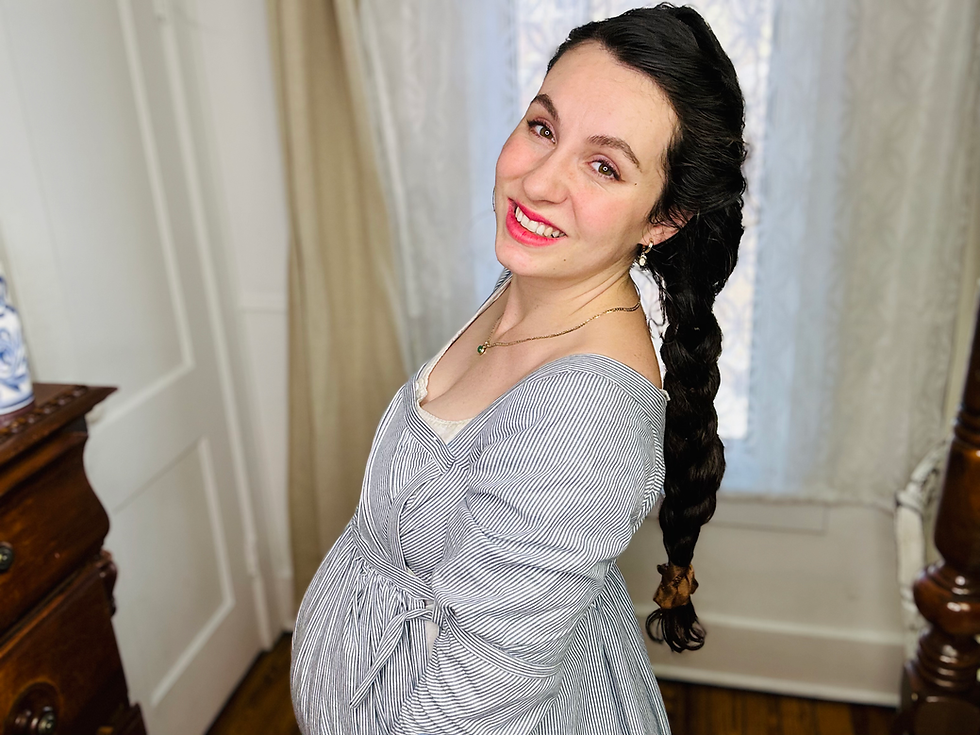
My Healthy Eating Inspirations
We all know that our hair is affected by the way we eat, right? If you didn’t know, now you do. I am a huge believer in the power of a healthy diet to heal (or better yet, prevent) all manner of problems, and to thrive in our bodies. Most of us agree on this. But we all have different definitions of what defines “a healthy diet” and so of course, this is simply my interpretation of what is a healthy and nourishing way for me to be eating at this point in my life.
There are all manner of different diet factions nowadays, and various groups who believe in cutting out certain food groups, and I am not one of these - I prefer a more balanced approach - partly because I have been there, done that with cutting out entire food groups and it wasn’t a good approach for me over the long haul.

Big pieces of diet inspiration for me has been Weston A. Price and his classic work “Nutrition and Physical Degeneration”, as well as a more modern book which works from his research - “Nourishing Traditions” by Sally Fallon. I’ll talk about Weston A. Price a bit later, in the section on supplements. If you are familiar with these books then you should already have an idea of where I am coming from.
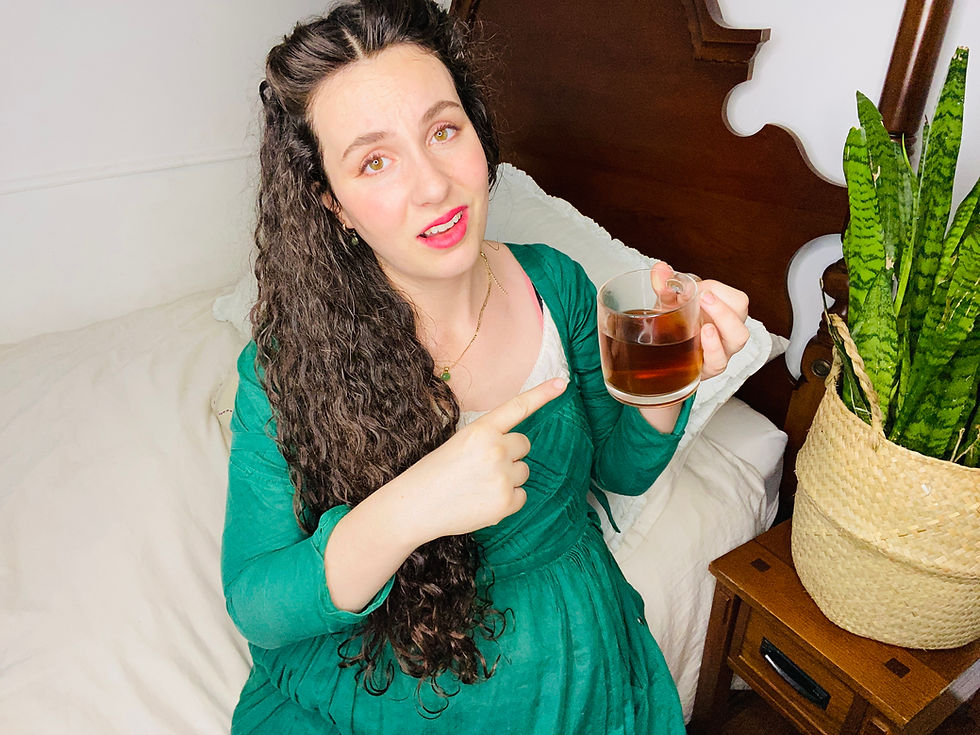
Rest assured that I am not a perfect example of following any particular diet approach, because my life is busy and I do my best. I also don’t want to ever get super stressed about eating in a certain way because that’s just not a healthy kind of energy to carry through life. I prioritize eating, especially lately, and eating well, but I do still eat out at times, and I am flexible. Usually, especially in pregnancy, my body quickly lets me know if there is something lacking in my diet and so I correct that.
More recently, actually during this pregnancy, I have been very inspired by the pro-metabolic approach to eating, which is not a diet but rather a way of eating that supports our bodies’ metabolism through eating frequently and feeding our bodies the most accessible forms of energy, as well as the inclusion of nutrient dense foods. I am recovering from a few years of intermittent fasting, which I am not convinced is a bad thing for everybody, but it was a bad thing for me in a lot of ways. My physical recovery after my last baby’s birth was not what I would have liked it to be, and in hindsight, knowing what I know now, it was at least partly because I simply was not eating enough.
Nutrient Dense Food

So, when I say nutrient dense food, what do I mean exactly? I mean foods that are extremely rich sources of vital nutrients for our bodies, such as but not limited to fat soluble vitamins like vitamin A, K, and D. I would also consider nutrient dense food to be sources which have these nutrients in an easily accessible form for our bodies. So, often, these are animal products, but I do also consume plant superfoods as a form of supplementation that I will talk about after we finish talking about food.
Brewer Pregnancy Diet

I am 35 weeks pregnant, so let’s talk about that side of things. I aim to follow a loose version of the Brewer pregnancy diet, which was developed by Dr. Tom Brewer in the 50’s and 60’s as a means of treating and preventing serious pregnancy complications such as eclampsia and hypertension. Basically, it is a great pregnancy diet because it takes into account the fact of blood volume expansion in pregnancy. If you didn’t know, in pregnancy our bodies are designed to double our blood volume - but if we aren’t eating enough food and enough protein and nutrients, this will either not be able to happen, or that blood will be very diluted and lacking in nutrients.
Anyway, the main tenets of the Brewer diet are eating first of all, enough calories, a ton of protein, and an adequate amount of salt, all of which are very important during pregnancy especially. Our modern culture seems to have a big emphasis on pregnant women not gaining “too much weight” and frankly I think this is dangerous because it can mean that pregnant women won’t be getting all of the calories and nourishment they need to safely grow, birth, and feed their baby.

So, I don’t follow any diet checklist or anything but I always have in my mind that I need to be eating a lot of protein per day. I eat whenever I am hungry, and I eat foods high in calories, like lots of healthy fats, and foods high in protein. I also salt all my food to taste using pink himalayan salt, and I have a good amount of carbs in my diet. More on those in a bit, I realize both of those are sort of dirty words nowadays.
What my Diet “Looks Like”

I eat whenever I feel hungry, which is very often these days. Every time I eat, I aim to include some protein. What does this look like practically? I eat a lot of eggs. Eggs are what I would consider a nutrient dense food, especially the egg yolk, which is high in a ton of vital nutrients, especially for a developing baby. I have at least 3, sometimes 4 eggs for breakfast every morning, and if I am in need of protein later in the day and there is no cooked meat convenient, I just make myself some eggs again.

Obviously, I am also eating meat - especially during pregnancy, most of the dinners we have been having have a main meat component. Often this is something simple - my husband has been BBQ'ing a lot lately. We buy high quality burgers that are raised free of antibiotics and hormones, and these patties only contain beef, nothing else. I’m also loving Italian pork sausages. When I cook something for dinner it is obviously something with meat or eggs, like a roast chicken that I cook in my Instant pot, or french Canadian meat pie, or an eggs and bacon breakfast for dinner. I’ve been keeping things quite simple lately. I aim to have veggies with every meal as well, but it doesn’t always happen. At the very least I aim to give all of my boys some saurkraut on the side of their meal, which they all love. I do try to eat one raw carrot per day for the fibre and cleansing benefits.
Snacks
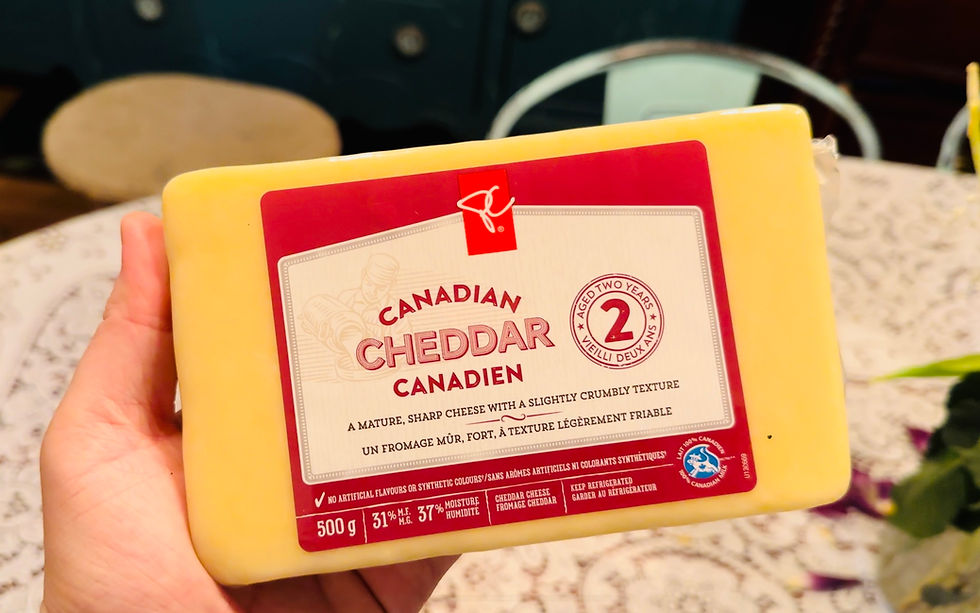
For snacks between meals, my main go-to’s have been high fat yogurt and raw honey, and when I say high fat, I mean it - we’re talking 11% milk fat, yogurt made with cream and milk. I also love old cheddar - I buy a brand that is aged for 2 years which means it is legally able to be made with raw milk, which I am a fan of but it’s hard to find here in Ontario Canada because it’s not legally able to be sold. I also love goat cheese and fresh mozzerella. If I am starving and in a pinch I toast a couple pieces of this German rye sourdough bread, spread them with lots of butter, and then have cheese on top. Protein, fat, and some carbs!
Finally, I love medjool dates - they are a great natural source of carbs and sugars for me, which I have only recently discovered are good things to get enough of, and supportive for our liver.
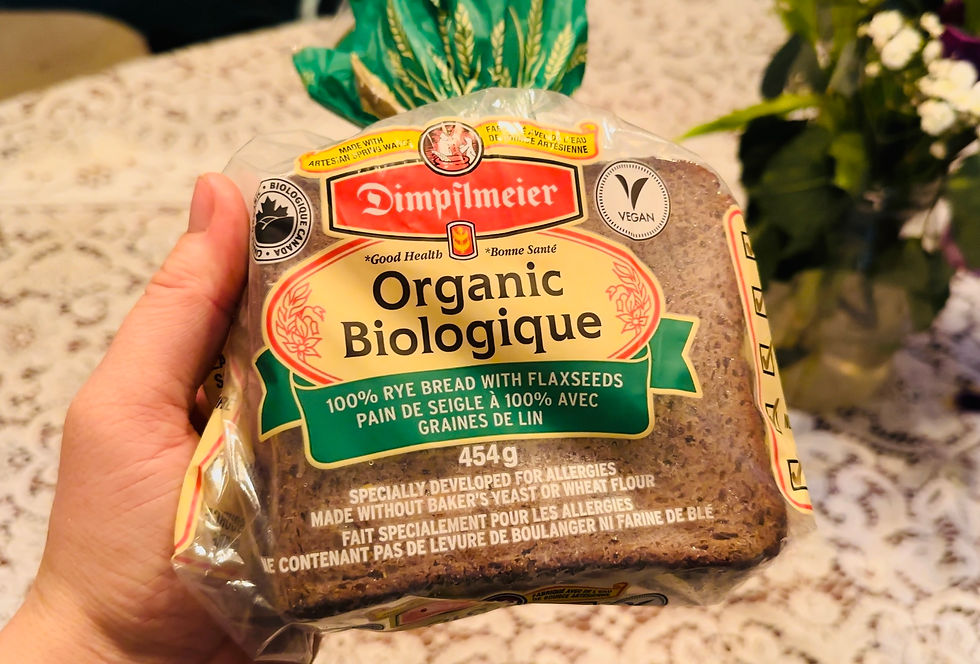
I find that I have been absolutely needing to eat something after dinners. In the past when I was intermittent fasting, this was a major no-no but now I know that my body needs it. If I don’t eat after dinner, I am starving by the time I lay down to go to bed and simply cannot make it until breakfast the next morning. If I did force myself to push through, I know I would be doing my body a disservice. Coincidentally, I always notice my baby kicking like crazy whenever I get really hungry, so that’s interesting.
After dinner is when I have more fun with my snacks because the kids are in bed and it is time for myself. I have a love affair with soufflé. My favourite snack to make for myself is vanilla soufflé - I double the recipe so it is made with four separated eggs, and there is milk and butter and a little flour and sugar in there as well. It is a little sweet, but not very much, and light and so nourishing. Like the ultimate comfort food. I started making soufflé for myself a few weeks after my last baby was born, and it was the most comforting thing during that postpartum.
I also have been loving making myself a vanilla custard as a snack. For this I use whipping cream, milk, raw honey, four egg yolks, and a little corn starch.
Finally, if I have egg whites left over after making myself a custard then I LOVE Italian meringue, but it is very sweet so I don’t have it too often. It is delicious though, and can be made with honey rather than sugar. It tastes like marshmallow fluff, and technically I wouldn’t consider it to be raw egg whites since it is made with very hot sugar syrup or honey that is poured into the egg whites and inadvertently cooks them.
PRODUCT LINKS
Books
Supplements/Foods
Gut Health Foods and Supplements
Bone Broth
I should definitely mention bone broth, collagen, and gelatin. In this pregnancy I have been aiming to consume bone broth everyday, and it has made a big difference for me. Bone broth is a real ancestral food that we see having been eaten in virtually all cultures throughout history, and often revered as a medicine. It is full of minerals, nourishing for the gut, and if made properly is a great source of gelatin which benefits hair, skin, bone, joint, and gut health. I also consume collagen powder which is like the precursor to gelatin, and I add this to my herbal infusion that I drink daily. It has largely the same benefits as gelatin.
Fat (Why I Love It)
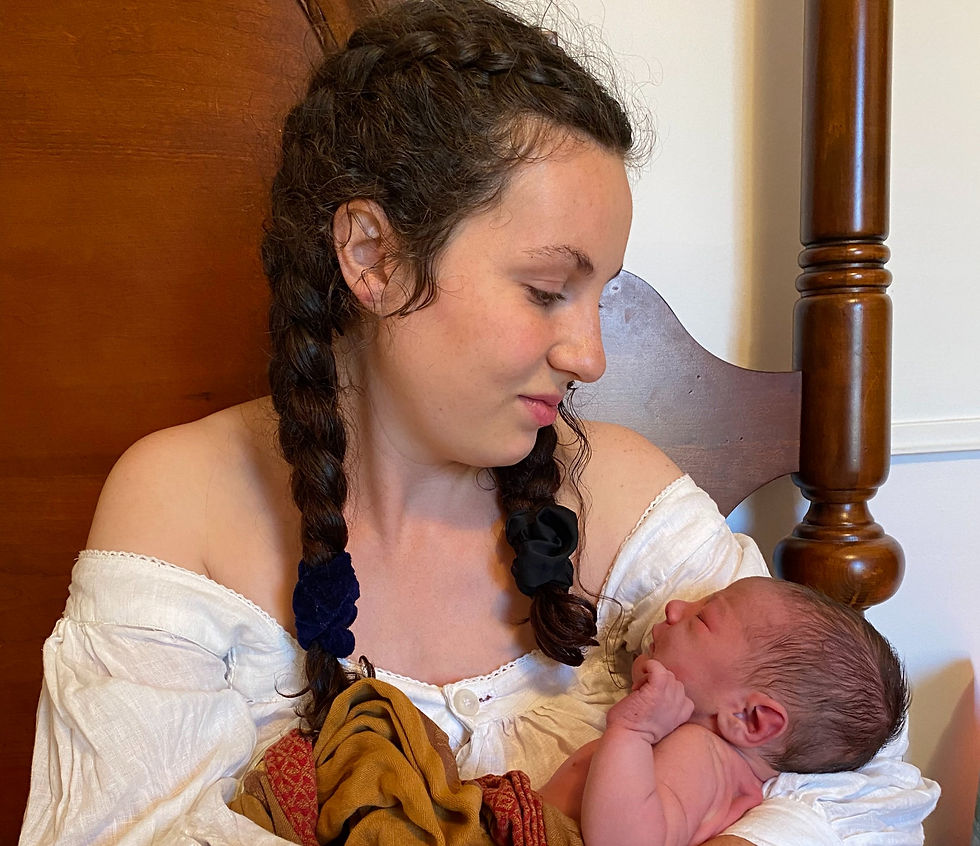
Okay, let’s talk about fat. I eat a lot of fat in my diet - I cook my fried eggs in a ton of butter, I cook with butter or animal fat, and anytime I eat bread or potatos I have tons of butter with it which actually helps to digest these carbs. In my opinion animal fats like butter, ghee, or tallow and duck fat are amazing nutrient dense foods, not to mention helping me feel more stable and nourished in my body. So in other words, I have come to believe that contrary to modern dietary wisdom, saturated fats are health giving and are in fact what humanity has been eating and cooking with for millenia, whereas modern vegetable oils and other trans fats are a franken-food that wreak havoc with our bodies.
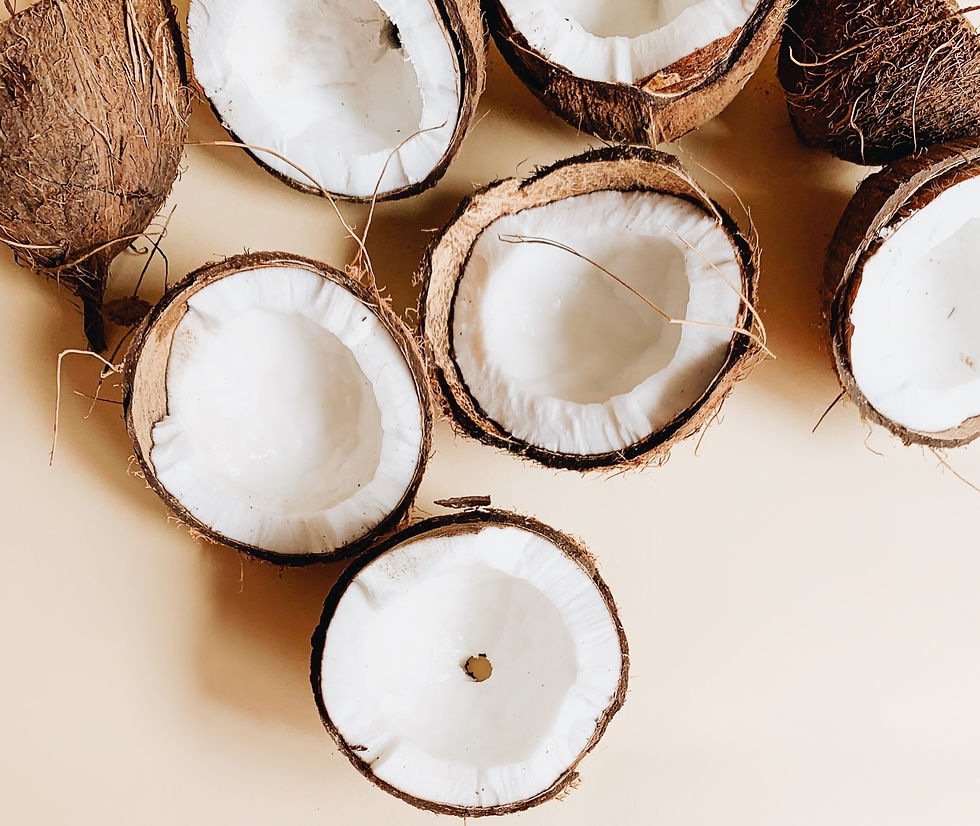
Let me give you an example - in this case, it relates to coconut oil. during my last pregnancy especially, coconut oil got me through. I took at least one but often as many as 3 large spoonfuls of coconut oil per day, which I would gulp down with a sip of water. During pregnancy I tend to sometimes get what I can only call “growing pains” (pains in what feels like the bones of my legs and arms) - which I always take as a red flag that my body is in need of more nutrients. I would also slot muscle cramps and spasms as well as tooth pain into this category. But when I was taking coconut oil or other fats regularly in my diet, this was never an issue for me. Eating fat regularly also helps me on an emotional level to feel more grounded and stable, less prone to being frazzled or anxious.
Carbs

Carbs have been a complex issue for me. I have never been anti carb, but I did go through a couple years of a very restrictive diet that involved cutting out all grains and starches, and so became by default relatively low carb. I didn’t do well on that diet - I was quite skinny, I began feeling rather ill and weak most of the time, and my hair broke and fell out a lot - this was about a year before my big chin length hair chop. Anyway, so nowadays I do include grains, starches, and all other carbs in my diet.
In theory I do believe the best way to consume grains is through the three S’s - souring, soaking, or sprouting, but realistically this is not always the way I consume them. I am quite picky about the bread products I choose to consume. I have baked a lot of sourdough in my day, but currently my life is busy enough that I have been buying full sourdough bread instead and eating that. The way to know if a bread is fully sourdough is from the ingredients list - if it’s fully sourdough, it will not contain any yeast, as it is risen through natural yeast from the sourdough starter.
Also, I love potatoes. Potatoes are one of my favourite foods and I eat them in many forms, but almost always combined with a protein.
Fermented Foods
I would like to give a nod to fermented foods, which I love and eat a lot of. I learned about the value of these from the book Nourishing Traditions, as well as that restrictive diet I was on, which was a gut-healing regime. When I say fermented foods, I am talking about things like saurkraut, kimchi, kombucha, and kefir. I love all four of these foods. Real fermented saurkraut is not pickled with vinegar, it only contains cabbage and salt and produces it’s own sour juice through the fermentation process. When I first found out the value of these foods, I was all into making them myself. I have made kefir, saurkraut, kimchi, and kombucha in my time.
But now I’m at a point where I still want the value of these foods, but I just do not have the head space or time to be making them regularly myself, so I have been buying them. I still have a scoby, kefir grains, and a sourdough starter tucked away in the back of my fridge in the hopes of one day getting back to it, but that time is not today. I will have some of these foods linked below.
Supplements
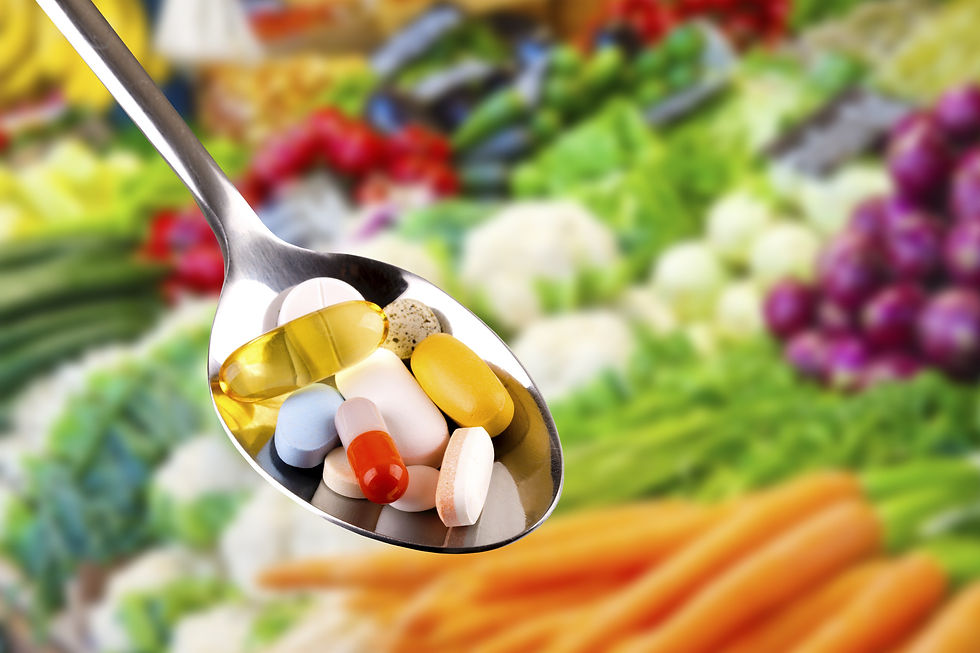
Okay, so let’s talk supplements, and talk about whyI don’t take a traditional prenatal vitamin, and haven’t for any of my pregnancies, excluding my first. In my first pregnancy, I took the prenatal vitamin, and a good quality one at that, because that’s just “what you do” when you’re pregnant, right? I never experienced it benefitting my health in any way, apart from causing me more nausea in the beginning. But I took it because I wasn’t focussing on a healthy diet and I figured I needed it to fill in some gaps.
After some time and a lot of research, I discovered some interesting things. Most vitamins and minerals in 99% of multivitamins, pills and capsules, are synthetic, made in a lab, and often do the opposite of what we want them to, because they clog up our bodies receptors for the real food-sourced vitamin and mineral, while providing none or only a fraction of the benefits which we were wanting from said nutrient.

This often means we are actually getting less of said nutrient than we would have been if we weren’t taking the pill. Folic acid is a perfect example of this. Folic acid is one of the main reasons people cite for why it is so important to take a prenatal vitamin, because it prevents neural tube defects. This is not true. Folate prevents neural tube defects. Folic acid is synthetic man made folate and all it does is clog up our receptors the real folate found in our diets, meaning we are absorbing less folate than we would have been had we not been taking folic acid. Even a lot of so called “food-based” multi vitamins will say on the label that they contain folate, but if you look in the fine print you will see in brackets or underneath, “as folic acid”.
Supplementing isolated vitamins or minerals can also cause imbalances, because when in real food, these vitamins and minerals come with an array of other complimentary nutrients that work in synergy. When we isolate these and take them in a vacuum, it can cause more problems.

All of that to say that I have come to the place where I have highlighted the most key nutrients and minerals that I know I need, and I have found food or superfood sources of these which I incorporate into my diet daily. So for example, eggs, specifically egg yolks are very high in B vitamins, vitamin A, folate, and vitamin D - which is one of the reasons I eat so many of them. I also take grass fed organic liver pills every day because liver is an extremely nutrient dense food - full of iron, zinc, vitamin A, D, B vitamins, and folate just to name a few. For a rich source of B-complex, I consume 2 tsp of bee pollen every day. I also consume a few plant based superfoods everyday: maca - which is an adaptogen, amla or camu camu, which are rich sources of vitamin C, and chlorella, which is a source of chlorophyll and a gentle detoxifier.
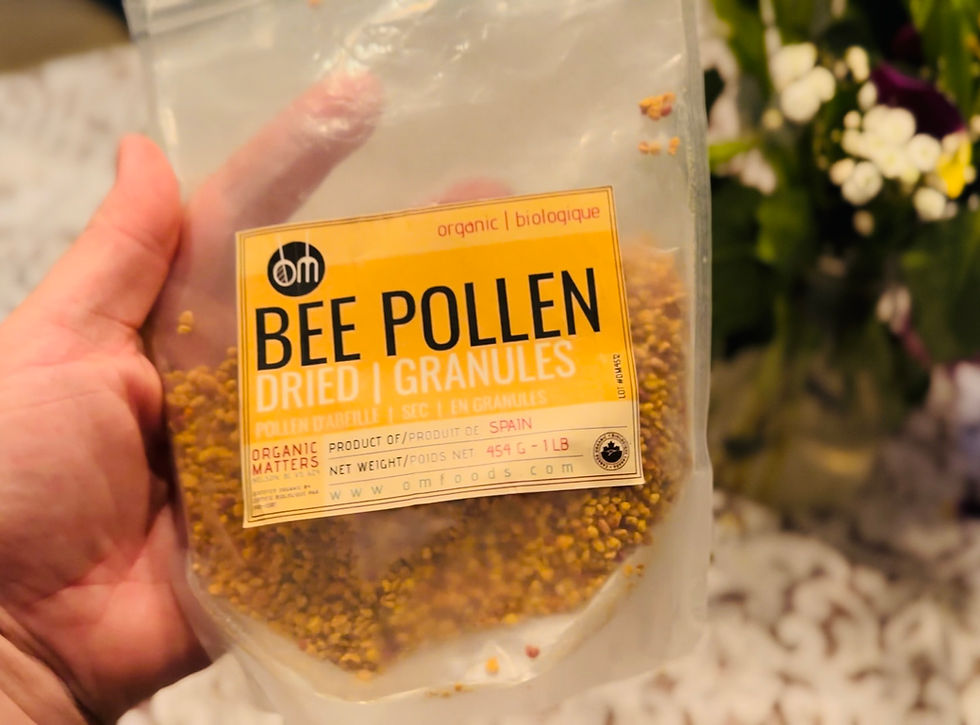
I also consume a high quality mixture of fermented cod liver oil and butter oil every day, which I first discovered the benefits of several years ago from reading about the work of Weston A Price. Price was a dentist and in the 20’s and 30’s visited various indigenous cultures around the world and found that many of them had amazing teeth and overall health, and he isolated this to the fact that they were consuming tons of foods rich in Vitamin A, K, and D - cod liver oil and butter oil work synergistically to deliver these in high amounts.

Finally, I drink a herbal infusion on most days that I make myself and I actually have a video already recorded on this recipe, that I plan on posting after the baby is born. It’s a great tea to drink to nourish and remineralize your body, which is great for hair health.
I’m not totally anti-supplement. I have also been taking magnesium in supplement form this pregnancy, because I do find it has made a big difference for me, especially in alleviating the early contractions that I tend to get each pregnancy. I’ve been occasionally taking extra vitamin D, and I do have a powder form of vitamin C on hand, mostly for when there is a sickness going around my family and I want to minimize the spread.
Finally, there is a lot of evidence to suggest that our gut health and having a biodiverse gut flora contributes greatly to how much nutrients we are even able to absorb from our food or supplements, which is one of the reasons I consume fermented foods daily, and sometimes take a probiotic supplement as well.

Okay, I think that’s all I wanted to talk about today! I wanted to reiterate that I am NOT anywhere near perfect in the realm of diet, but what I laid out today are like my diet goals, which I sometimes fall short of because as much as I try to prioritize a healthy diet, I am currently juggling a lot of things in my life. Baby steps all the way, right? Also, a lot of these things I mentioned are dietary pieces of wisdom that I have been aware of for several years, but had an ebb and flow pattern with. It is really in this pregnancy that I have come back to a lot of these things at once, because with this baby being my fifth and (not going to lie) having some fears about how my body will cope, it has inspired me to nourish myself more, so this pregnancy has been a real healing messenger for me.
PRODUCT LINKS
Books
Supplements/Foods
Gut Health Foods and Supplements
Do you see a link between hair health, or physical health, and our diet? I would love to hear your thoughts in the comments section.
If you enjoy historical hair care content, as well as historical hand-made fashion, be sure to subscribe to my email newsletter so you never miss a new article! I have lots more ideas for historical hair care and skin care videos that you won’t want to miss.
If you would like to learn the recipe for my favourite hair growth oil of all time, you can learn that here.
If you found this information wildly helpful and informative and would like to thank me, consider "buying me a coffee" through one of the buttons throughout this article. Thanks! I appreciate it so much! Click here for the full list of sewing products I recommend. Click here for the full list of hair-care products I recommend. Click here for the full list of makeup and skincare products I recommend. I have personally used all of these products and can wholeheartedly recommend them to you. It also helps support this blog if you purchase anything through one of those links because I receive a small commission at no extra cost to you.
Contact me at katherine@katherinesewing.com









let’s quickly explore the food sources.
Dairy Products
Fruits & Veggies
Whole Grains, Pulses, Etc.
Healthy Fats
Traditional Nutrition
Consumption of Liquids
Want to buy Gond Dry Fruit Laddu? Check out Maamitahara for premium quality gond dry fruit and gond laddu with a 100% guarantee of pure ingredients & hygiene.
https://maamitahara.com/product/postnatal-gond-giri-laddu/
Could you please provide the recipes for your vanilla soufflé, custard, and Italian meringues.
I was going to ask (when I remembered) about your diet, too. This seems the direction I've been going in. I'm trying to build skills and piece together information on health, and I'm also trying to figure out how to get good habits in household chores (before I have children underfoot!). I know how many things can fall out of daily habits when children come along. At least I know one thing: I don't NEED to have children spaced one year apart like my mother! I will say there is a wonderful sense of accomplishment doing things for oneself. I have to get over the hill of lethargy after the initial excitement wears off, but if I do, there's a kind…
I had my babies at home and was introduced to the Brewers (the couple, not simply their books) by my midwife. Mrs. Brewer was incredibly helpful to me via phone conversations during my second pregnancy/first homebirth. It pleases me to hear that they're still positively influencing someone who's younger than my youngest (adult) child. 🙂